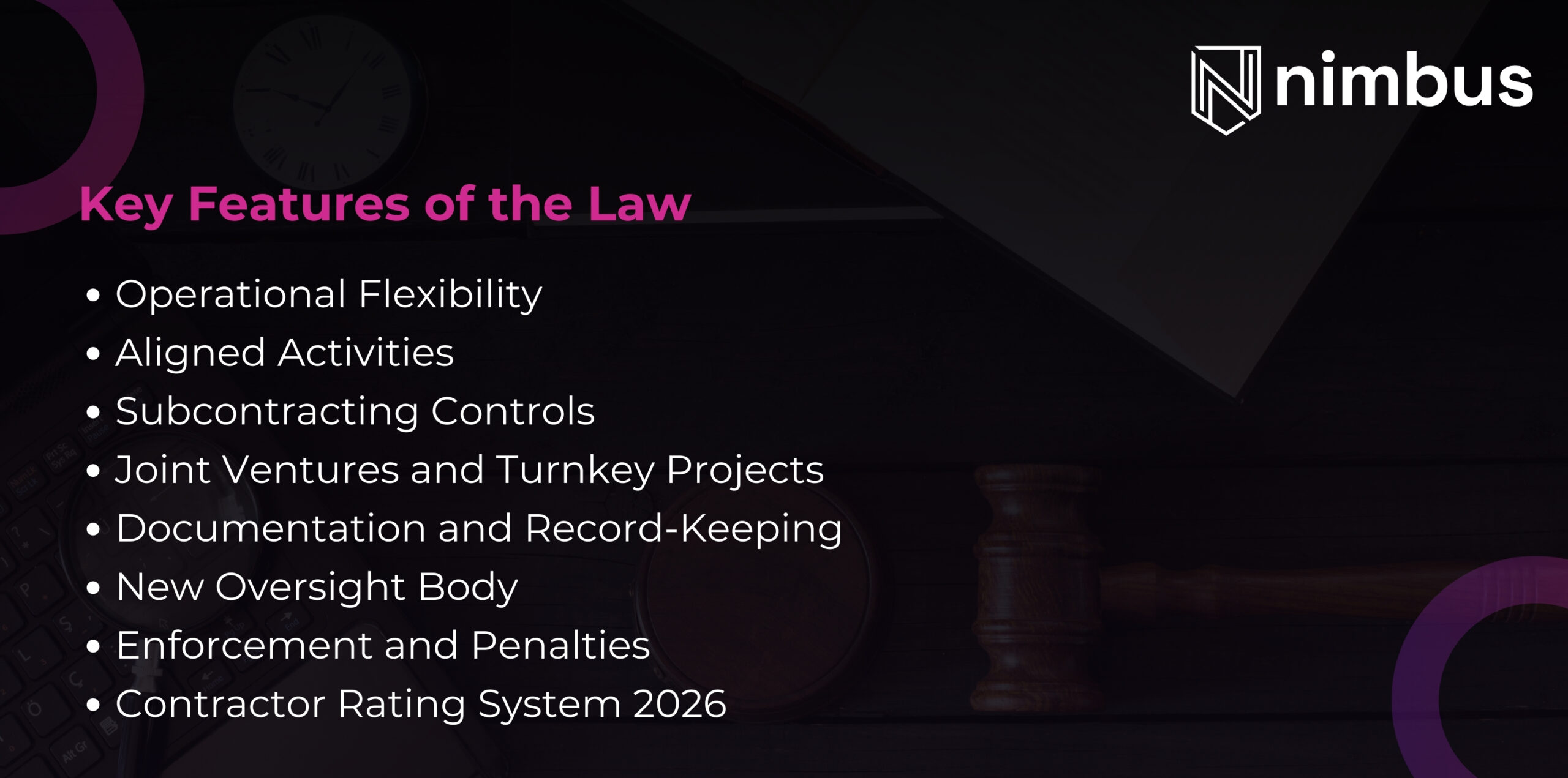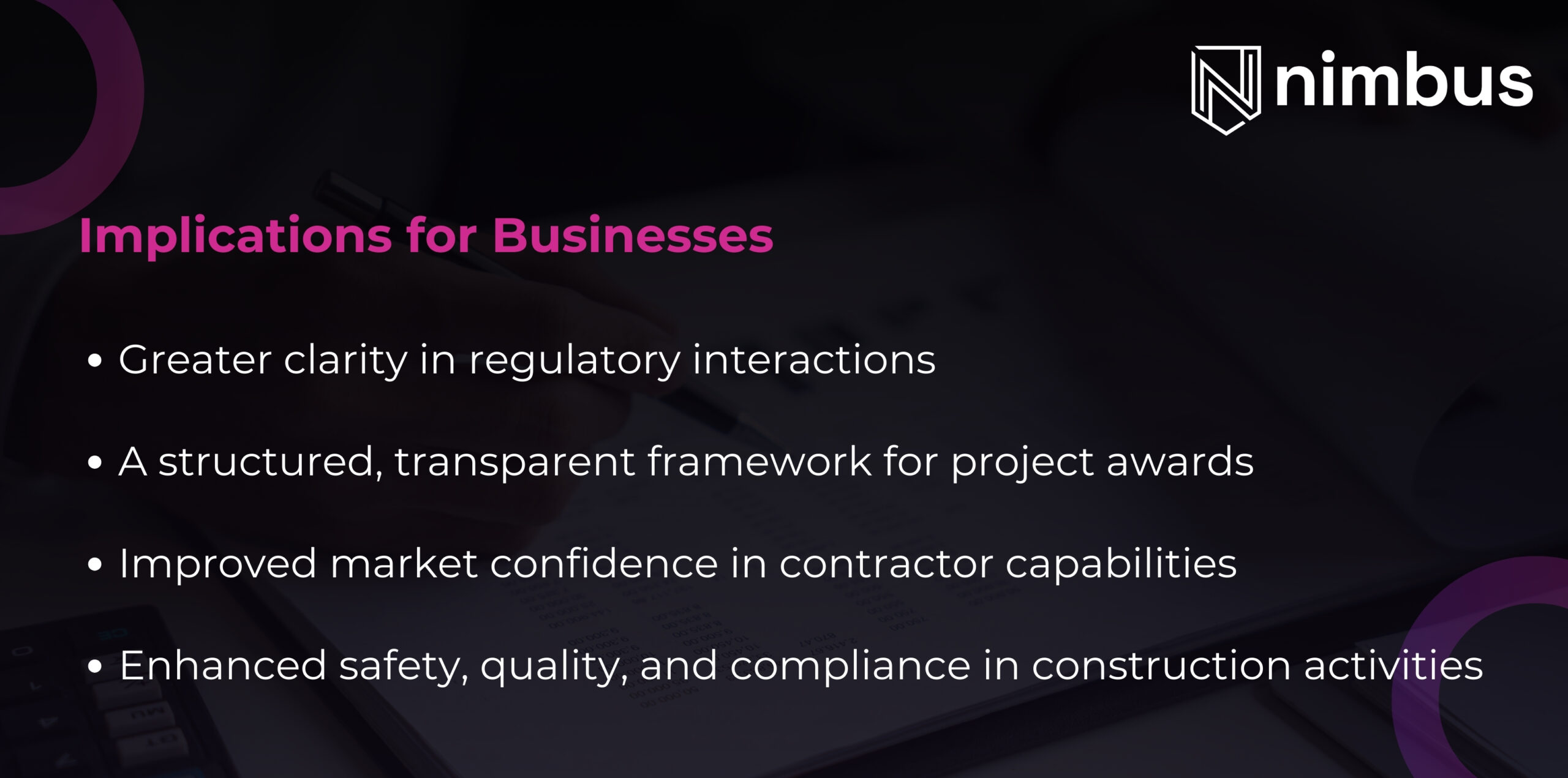Dubai is set to reshape its construction and contracting landscape with the introduction of Law No. 7, 2025, which comes into effect on January 15, 2026.
This law establishes mandatory registration, professional certification, and a compliance-linked classification system for all contractors operating in the emirate, including those in Dubai free zones and the Dubai International Financial Centre (DIFC).
Airport-related projects are exempt, but all other construction and engineering activities fall under the law’s scope. Contractors have a one-year transition window to align their operations with the new regulations.
Key Features of the Law

Mandatory Registration and Certification
Contractors will need to be formally registered in the central Contractor Register maintained by Dubai Municipality. This register is integrated with the Invest in Dubai digital platform, providing a unified compliance and licensing framework.
- Contractors must operate only within their assigned category and technical specialization.
- New entrants start at the lowest classification tier and can only progress after meeting specific criteria for higher categories.
- Technical personnel must obtain a professional competency certificate from Dubai Municipality, and contractors are responsible for ensuring their staff meet this requirement. Hiring uncertified personnel could lead to penalties.
Contractor Classification and Evaluation
The law introduces a classification system that replaces the previous lowest-bid model. Project awards will now consider a contractor:
- Technical capacity
- Workforce competence
- Financial stability
- Compliance record
This approach encourages contractors to prioritize quality, safety, and professional standards over cost alone.
Subcontracting Controls
Contractors may only subcontract work if:
- The main contract allows delegation
- The subcontractor is licensed and registered
- The subcontracted work matches the subcontractor’s licensed activity
- Prior approval is obtained from the designated authority
Any informal or unapproved subcontracting arrangements could result in enforcement actions or fines.
Joint Ventures and Turnkey Projects
Law No. 7 regulates unincorporated joint ventures (JVs) and turnkey contracts. Contractors must obtain prior approval to form JVs, and turnkey projects are subject to regulatory oversight. These provisions prevent informal partnerships while allowing flexible project delivery models.
Documentation and Record-Keeping
Contractors must maintain:
- Original contracts
- Project records
- Supporting documentation for at least 10 years after completion or termination
A code of conduct and ethics is expected to be issued, which contractors will be required to follow. Compliance ensures transparency, accountability, and higher industry standards.
New Oversight Body
A dedicated Contracting Activities Regulation and Development Committee will oversee implementation. Chaired by Dubai Municipality, the committee will resolve jurisdictional overlaps, approve contractor activities, and update policies.
Enforcement and Penalties
Non-compliance will carry strict penalties:
- Fines ranging from AED 1,000 to AED 100,000 for first-time violations, doubling for repeated offenses within the same year
- Suspension of construction activities
- Downgrading or removal from the contractor registry
- Trade license suspension or revocation
- Deregistration of technical staff or cancellation of competency certificates
Contractors must take these changes seriously, as they have real commercial and operational consequences.
Contractor Rating System 2026
Dubai Municipality plans to launch a performance-based Contractor and Engineering Consultancy Rating System in early 2026. This system will evaluate contractors on financial discipline, technical capacity, and compliance history.
The ratings will complement the classification system, influencing project eligibility and opportunities for higher-tier contracts.
– Preparing for Compliance
Contractors in Dubai should begin preparing now to ensure full compliance by January 14, 2027. Immediate steps include:
- Reviewing current projects and contracts against the new classification system
- Ensuring all technical staff obtain professional competency certificates
- Auditing subcontracting arrangements and obtaining formal approvals
- Implementing systems to retain and archive contracts and documentation for 10 years
- Establishing internal compliance teams to monitor readiness
– Implications for Businesses
The new law raises the bar for professional standards and accountability in Dubai’s construction sector. While the requirements add operational responsibilities, they also provide:

- Greater clarity in regulatory interactions
- A structured, transparent framework for project awards
- Improved market confidence in contractor capabilities
- Enhanced safety, quality, and compliance in construction activities
For companies considering business setup in Dubai, these changes may influence partnerships with contractors, joint ventures, and infrastructure projects. Contractors operating under Law No. 7 will be more reliable partners for local and international investors.
Looking Ahead
Law No. 7 represents a strategic move toward a professionalized, regulated, and efficient construction market in Dubai. By linking licensing and project eligibility to competence and compliance, the law encourages sustainable growth and higher standards across the sector.
Contractors who adapt early will not only avoid penalties but also gain a competitive advantage, particularly in large-scale projects and government contracts.
As Dubai continues to strengthen its business ecosystem, including UAE company formation and business setup services, compliance with this law becomes a vital part of operational strategy.



